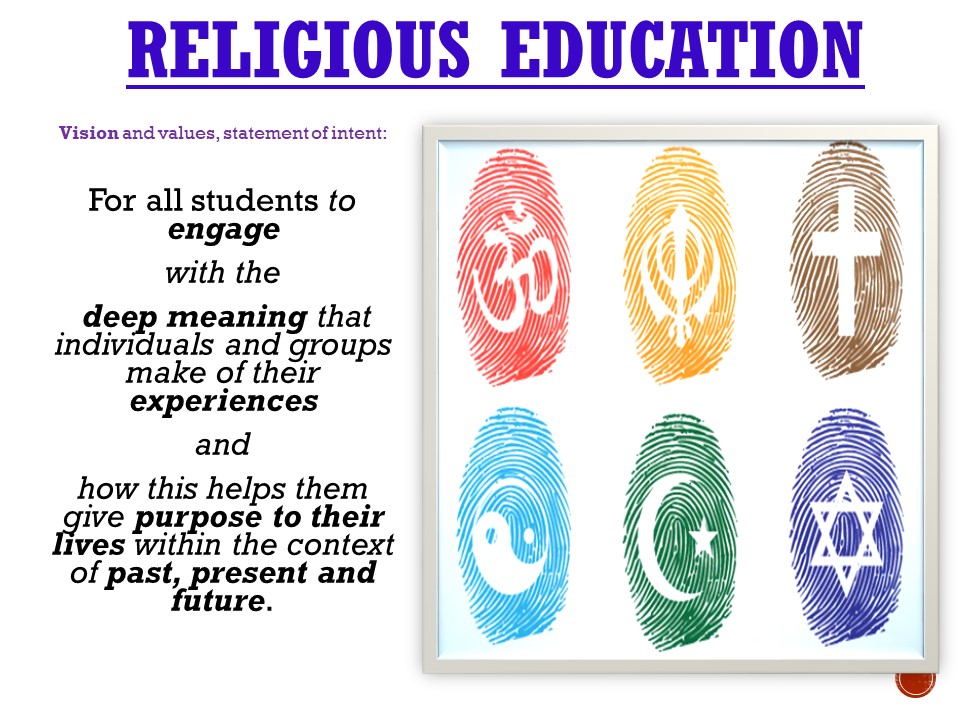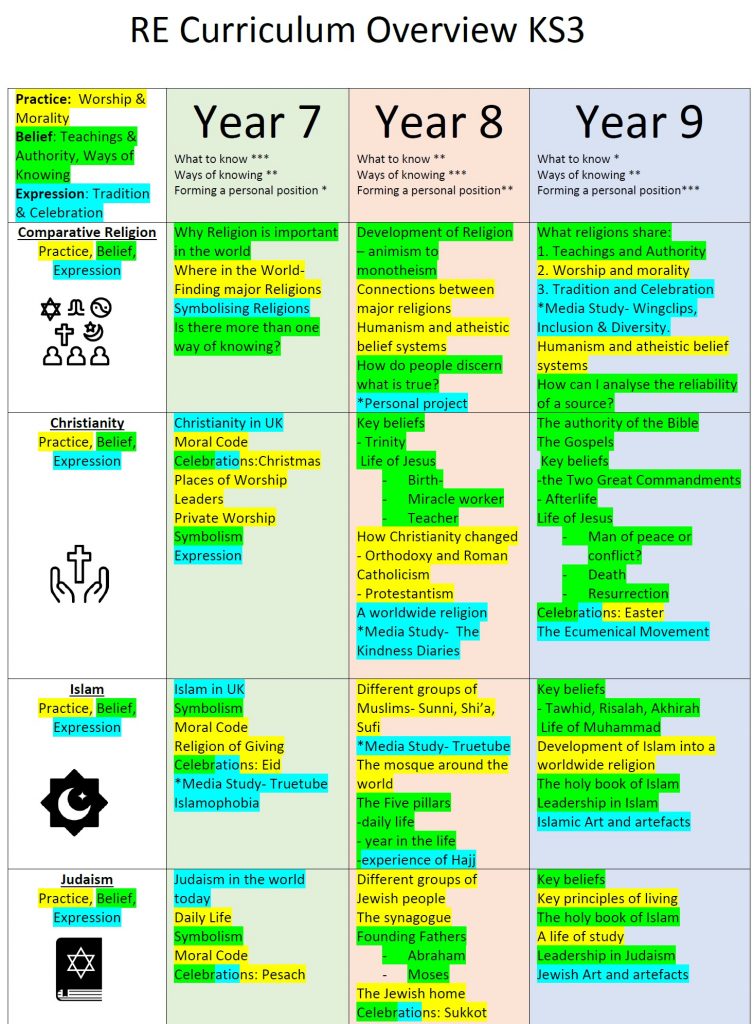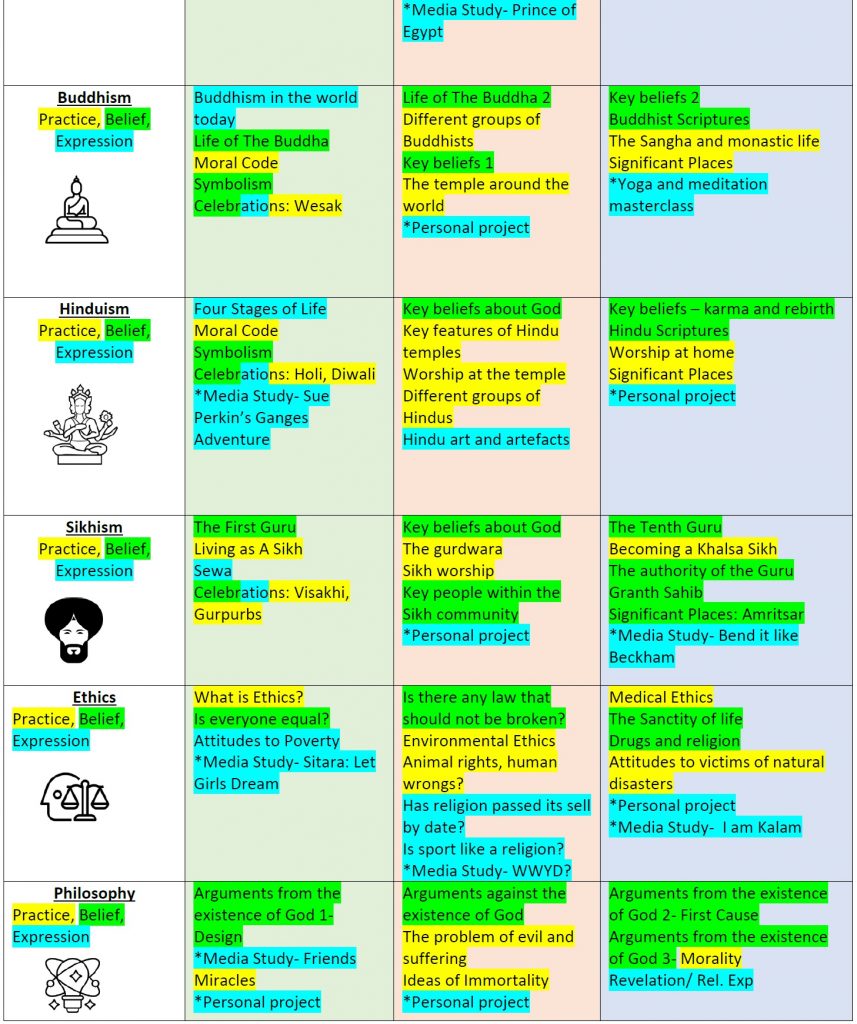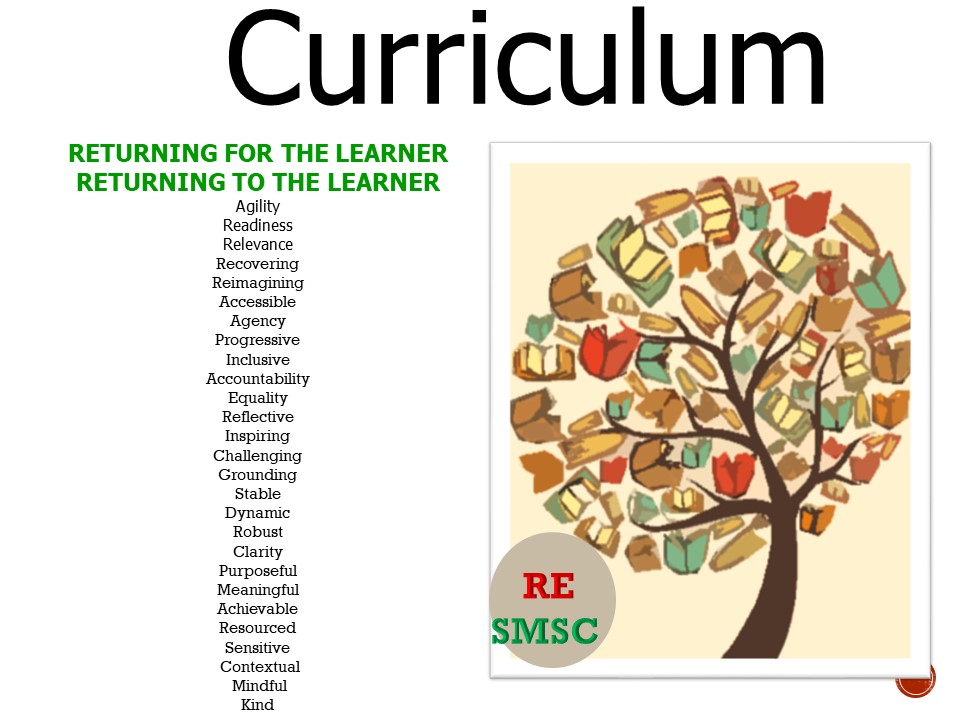“For all students to engage with the deep meaning that individuals and groups make of their experiences and appreciate how this helps give purpose to their lives”



Curriculum Principles
Key Concept Grid
What do we want to achieve? The active promotion of our Core Values, including British Values
We want RE in school to be challenging, inspiring and fun.
We want pupils to develop their levels of religious literacy and conceptual understanding We want them to be able to articulate, with confidence, their ideas about religion,
We want them to be able to articulate, with confidence, their ideas about religion, beliefs and spirituality – and then to change their minds, if they choose to do so.
We want learners to understand religious and belief systems’ commitment to morality and social justice, to responsible stewardship of the environment and to deepening the experience of being human.
We want people to come to an informed and empathetic understanding of different groups which will help promote cohesion and integration. Pupils will explore British values in relation to religions and beliefs
We want to nurture academic rigour into the study of religion and beliefs. The study of RE can be complex and controversial. It demands multi-disciplinary study and they require understanding of difficult language and concepts. Such learning is rewarding at all levels. Both teachers and learners can develop personally through RE, challenging preconceptions, asking for justification of opinions, re-assessing their own stance on issues and recognising the vast, fascinating and challenging nature of religious study.
Year 7
Believing: What beliefs do people hold?
This is a skill-based, student-led curriculum for Year 7
Aim: To know about and understand a range of religions and worldviews, so that they can:
-
- Describe, explain and analyse beliefs and practices, recognising the diversity which exists within and between communities and amongst individuals
-
- Identify, investigate and respond to questions posed, and responses offered by some of the sources of wisdom found in religions and worldviews
- Appreciate and appraise the nature, significance and impact of different ways of life and ways of expressing meaning.
Year 8
Expressing: How do people express their beliefs?
This is a skill-based, student-led curriculum for Year 8
Aim: To express ideas and insights about the nature, significance and impact of religions and worldviews, so that they can:
- Explain reasonably their ideas about how beliefs, practices and forms of expression influence individuals and communities
- Express with increasing discernment their personal reflections and critical responses to questions and teachings about identity, diversity, meaning and value, including ethical issues
- Appreciate and appraise varied dimensions of religion.
Year 9
Living: How do expressed beliefs influence and affect how people live?
This is a skill-based, student-led curriculum for Year 9
Aim: To gain and deploy the skills needed to engage seriously with religions and worldviews, so that they can:
-
- Find out about and investigate key concepts and questions of belonging, meaning, purpose and truth, responding creatively
-
- Enquire into what enables different individuals and communities to live together respectfully for the wellbeing of all
- Articulate beliefs, values and commitments clearly in order to explain why they may be important in their own and other people’s lives.

KS4 AQA GCSE Religious Studies A
Students should consider different beliefs and attitudes to religious and non-religious issues in contemporary British society. They should be aware that the religious traditions of Great Britain are, in the main, Christian, and that religious traditions in Great Britain are diverse. They mainly include Christianity and Islam as well as non-religious beliefs such as atheism and humanism. This knowledge may be applied throughout the assessment of the subject content.
3.1 Component 1: The study of two selected world religions in depth:Christianity and Islam
- Beliefs
- Teachings
- Practices
3.2 Component 2: Thematic studies. Students should study a total of four themes:
- Sex, marriage and divorce
- Families and gender equality
- Religion, peace and conflict
- Religion, crime and punishment
Assessment: 100% written exam. NO coursework or practical element. Our GCSE exams in Religious Studies A include questions that allow students to demonstrate their ability to:
- Apply knowledge and understanding of two religions
- Apply knowledge and understanding of key sources of wisdom and authority including scripture and/ or sacred texts, where appropriate, which support contemporary religious faith
- Understand the influence of religion on individuals, communities and societies • understand significant common and divergent views between and/or within religions and beliefs
- Apply knowledge and understanding in order to analyse questions related to religious beliefs and values
- Construct well-informed and balanced arguments on matters concerned with religious beliefs and values set out in the subject content.
KS4 SMSC
Social, Moral, Spiritual and Cultural is held in high regard throughout our Federation. Once a fortnight, KS4 pupils have designated curriculum time with a specialist teacher to explore critical questions in terms of their own personal development and their journey into the wider world. Our SMSC carousel programme covers a range of topics over a two-year cycle. Specialist Lessons regarding E-Safety, Mental Health, risk -taking behaviours, peer-on-peer abuse and human rights are also incorporated and often supported by local agencies such as the police and health -teams. Our approach is flexible and pro-active; we will respond to issues as they emerge for students in our care. We aim to help nurture young people as they make important transitions to adulthood and equip them with the relevant skills and knowledge they need to be safe and successful global citizens.
Spiritual |
Social & Moral |
Cultural( incl EW, FC, Citizenship) |
| Life- Changing Decisions: Key qstn:How can I make informed decisions about valuing my identity, health and well-being? |
Global Citizenship Key qstn:How can I make informed decisions about current affairs, campaigns and my role as a global citizen? |
Making my way in the World Key qstn:How can I make informed decisions about money and careers? |
| Appearance Ideals | Intro/ vision/ goal-setting/ new charter | Intro: Political models – capitalism/ socialism/ democracy / rights & responsibilities /Wealth Distribution world/ Uk/ Money |
| Body Modification | International Peace Week/ Genes for Jeans | Multi-cultural Britain- census, Equality Law poss Brexit ( file), |
| Economic impact/ career choicesCaptain Steve Mitchinson | European Languages Day/ Community; Breast Cancer AwarenessUWO, 2 PWRR Dhekelia | Economic impact/ career choices/ immigration/ cost of living |
| FGM | Black History Month/ Reward/ Children in need | Career Exploration – icould.com |
| Where can I go? ( Nurse) | Remembrance/ Anti- bullying | Where can I go? Visit: Career Advisor |
| Community Health & Education Posters ( AfL ) | Change/ Migrants/ Christmas ( AfL) | Interviews ( dress up/ rehearsal) ( AfL) |
KS3 PSHE
PSHE is held in high regard by pupils and parents throughout our Federation. Once a week, KS3 pupils have designated curriculum time to explore critical questions in terms of their own personal development and their journey into the wider world. Our PSHE programme covers a range of topics over a two-year cycle. Specialist lessons regarding E-Safety, Mental Health, risk -taking behaviours, SRE, peer-on-peer abuse and human rights are also incorporated and often supported by local agencies such as the padre, careers advisor, local police and health -teams. Our approach is flexible and pro-active; we will respond to issues as they emerge for the students in our care. Even when we revisit topics, we ensure that the content and skills are always challenging and advance student understanding in terms of age-appropriateness so that learning progresses.
We aim to help nurture young people as they make important transitions to adulthood and equip them with the relevant skills and knowledge they need to be safe and successful global citizens.
Sex and Relationships Education This unit builds upon prior learning regarding healthy relationships, self-esteem and confidence and deferring sexual activity. We discuss the influence of online influences on sexual behaviour and sexual risk-taking. We consider issues surrounding sexual orientation and consent. The pupils also begin to learn about the services provided by sexual health clinics.Read our letter to parents here: SRE Letter KS3 |
| Homework: Pupils are encouraged to read the recommended literature available in class. The Sex and Relationships unit may include an ongoing collaborative homework Project which will involve research and presentation of knowledge gained through secondary research as well as conducting interviews and written analytical work. |
| How to help: Take part in a discussion with your child encouraging them to put forward their own point of view. SRE Child Protection Growing up online Childnet Hot topics Parents’ guide to technology Get safe online Channel 4 |
<Here is a selection of the topics and themes that we study during KS3.
- Politics & global current affairs – UK elections and political landscape, campaigns and new features of interest. Lessons run concurrently with Themes of the Week
- ACTIVE CITIZENSHIP, Planning and presenting a successful whole school assembly and/ or fundraising event.
- Mental Health incl. how to identify, types, what to do and how to support
- Physical Health incl. self-care,puberty, seeking advice, healthy eating incl. energy & caffeine drinks.
- Body & Appearance: incl. media influences and self-esteem.
- Sexual Health and Relationship Wellbeing incl. forced Marriage, consent, victim-blaming, sexual abuse, homophobia, resources about what to do and how to get help. See Parental Letter for details on age-appropriate topics and themes.
- Emotional Health: PSHE Association recommended DEAL resource, Samaritans.
- Risk taking behaviours incl.body modification, alcohol, drugs, gambling.
- CEOP: E-Safety incl.security, making sound judgements, digital reputation and future consequences, appropriate content, the law.
- Parenting incl. Real Baby- simulation baby experience, rights and responsibilities.
- Risk & Road Safety- to include Drive IQ resource (KS4&5)
- Multi- cultural environments incl modern Britain, diversity and equality laws and expectations.
- Discrimination & Prejudice ( to include homophobia and Islamophobia and gender-targeting crimes)
- Skills4Life ( Careers site)
- Health & Safety in the workplace.
- Study skills, life-long learning and nurturing a Growth Mindset.